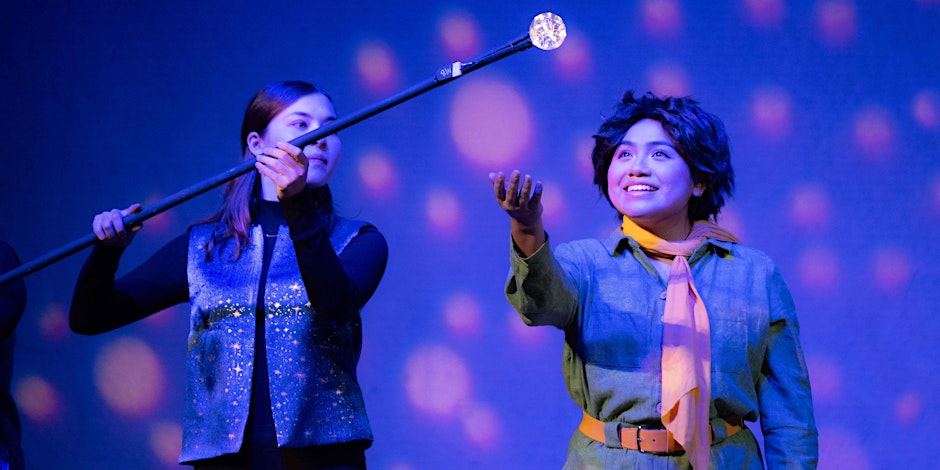DePauw’s latest opera, “The Little Prince,” opened on February 29 and ran its last show on March 3. Based on the novella by Antoine De Saint-Exupery, with Libretto by Nicholas Wright and Music by Rachel Portman, it was sung in English and had English supertitles. The two casts for main roles of the Prince, Fox, Rose, Lamplighter, and Snake performed on alternating days of the opera. Director Mary Martin, describes it as “a mysterious and wonderful story translated into over 500 languages.”
The themes of The Little Prince are universal, centered on love, companionship, imagination, and unfettered curiosity. True to the novella, it starts with a picture of a snake digesting an elephant, or a hat, depending on how you look at it. The pilot is the narrator and uses the image to introduce himself as an adult whose creativity was quashed as a child, which drove him to take to the skies for a living. When the pilot becomes unexpectedly stranded in the Sahara desert, the Little Prince finds him and rekindles the spark of his imagination with his seemingly absurd requests and questions. An unlikely friendship blooms between the two in an unusual tale of adventure, longing, and understanding. While their first encounter is filled with frustration and misunderstanding, the Prince and the Pilot gradually become friends as we learn more about the Prince’s mission to help his Rose.
Journeying to various planets, the Prince seeks a way to prove to his Rose that he loves and cares for her. Both actors are dedicated to their roles as we see a beautiful bond between them, enhanced by their body language and vivid expressions on stage. On his way, the Prince meets a selection of characters that symbolize the conventions and norms surrounding adulthood in our capitalist society. We witness greed, hierarchy, selfishness and a lack of wonder and imagination in life. The set changes efficiently with each character without seeming rushed, and each set complements its corresponding character perfectly.
When the Prince finally reaches Earth, he meets another variety of beings that impart their knowledge and experiences on him. The Fox conveys the significance of intangible things like friendship, love, and the non-materialistic care that one pours into something. He also helps the Prince see that his Rose is special because of the bond that the Prince has fostered by caring for her and watering her every day. This lies at the core of the message, and was a significant theme in the book as well. It teaches us that just because something is not unique, doesn’t mean that it’s not worthy of attention and wonder. Moreover, the stars are a constant presence on stage and represent the beauty and vastness of the universe. Each star truly shone with joy and coordination as an ensemble on stage.
The director states that they chose this operatic rendition for its themes of “reconnecting with our inner child, the awe-inspiring power of nature (and the stars!) and prioritizing our loved ones above all else.” They also “embraced the idea of performing a contemporary opera written by a woman.” A lot of the leads were women-identifying and showcased immense talent and dedication to their roles. The Little Prince himself was played by Zoe Kales ‘25 and Ella Lichatowich ‘25, keeping up with the long-standing “operatic tradition of substituting female voices for young boys’ roles when those male voices are not available.” Overall, the opera did justice to the original book and left its audience with food for thought and a harmonious melody for the soul.



